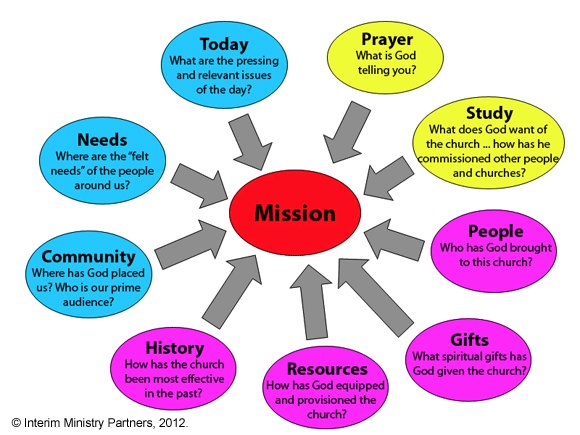These words are usually said emphatically, as if uttering them puts the whole subject of a congregation's mission to rest, permanently. And at one level, the statement about "our mission" is 100% true. As Bible-believing followers of Jesus who are led by the Holy Spirit and committed to seek God's will in prayer, Scripture does provide us with the guidance we need to determine our mission.
On the other hand, these emphatically uttered words are also 100% unhelpful if they are used to excuse leaders and congregations of their responsibility to discern the call of God for them in their specific set of circumstances.
 Behind the letters to churches in the New Testament lies an implicit truth: God has a plan for each congregation based on it's specific location, the needs of its community, the challenges of its culture, and its unique opportunity to be Jesus' bodily presence. God's plan must be at the heart of a congregation's mission.
Behind the letters to churches in the New Testament lies an implicit truth: God has a plan for each congregation based on it's specific location, the needs of its community, the challenges of its culture, and its unique opportunity to be Jesus' bodily presence. God's plan must be at the heart of a congregation's mission.
When we read Revelation chapters 2 and 3 - known as the letters to the "Seven Churches of Asia"- Jesus reminds us that the mission of each of these churches is different even though they are located in the same geographical vicinity. Paul's letters to churches in the New Testament - Romans, 1 & 2 Corinthians, Galatians, Ephesians, Philippians, Colossian, 1 & 2 Thessalonians - demonstrate this same principle. While they share common threads of universally applicable truth, each letter to a church contains very specific teaching targeting urgent and ongoing needs that refine the specific mission of each congregation.
When it comes to mission, we recognize that the Bible gives us universal applicable truth:
- The Great Commands
"'Love the Lord your God with all your heart and with all your soul and with all your mind. This is the first and greatest commandment. And the second is like it: 'Love your neighbor as yourself. All the Law and the Prophets hang on these two commandments" (Matthew 22:37-40 NIV).
- The Great Commission
Therefore go and make disciples of all nations, baptizing them in the name of the Father and of the Son and of the Holy Spirit, and teaching them to obey everything I have commanded you. And surely I am with you always, to the very end of the age" (Matthew 28:19-20 NIV).
- The Great Call
But you are a chosen people, a royal priesthood, a holy nation, God's special possession, that you may declare the praises of him who called you out of darkness into his wonderful light (1 Peter 2:9 NIV; cf. Ephesians 1:3-14).
These "pillar passages" have themes that recur again and again throughout Scripture. They present God's vision of the kind of people he expects us to be - people who put God first, who love those around them, who share the message of grace with all nations helping them bring the truth of Jesus to life in their lives, and people who live to praise and bring glory to God for bringing them out of darkness.
 Yet how is this congregation supposed to live out this kind of vision in their unique context?
Yet how is this congregation supposed to live out this kind of vision in their unique context?
How is this congregation going to follow Jesus with its own distinctive opportunities and specific challenges?
If God intentionally has a congregation where it is at a specific moment in time, what is this congregation's specific responsibility as this congregation seeks to live out God's vision?
This is what we must discern as God's people if we are to live faithfully to his call for us. This is our mission as we seize the opportunities that the Father has given us in our unique location, point in time, and collection of gifts as a congregation.
So how do we study Scripture to discern this specific congregational mission from Scripture?
First, begin with those universal commands to be obeyed by all disciples -
The Great CommandThe Great CommissionThe Great CallSpend time learning these commands and committing them to memory. Read them in different translations to pick up the nuances of God's will. Pray for God to help you see ways you need to obey them in our life. Here are some questions to help you refine your focus:
- How do we put these into practice in specific ways in our neighborhood, our city, and our areas of influence as a church?
- Who is in darkness around us that God can use us to bring his light and life?
- Who is our neighbor that we are to love and how can we more specifically love them as Jesus does?
- What are the cultural barriers that God wants us to remove and what people groups near and far has the Spirit positioned us to love, reach, and teach to fully follow Jesus?
This spiritual process of communal spiritual discernment helps you get started thinking about your specific mission in concrete ways. It opens your eyes to God's opportunities. It connects you to the other processes of discernment. (Remember, this is part of an ongoing series of messages that help us with a cluster of related ideas on discerning our mission so this Scripture study is not done in isolation from these other processes!)
- Begin with the "Seven Churches of Asia" in Revelation chapters 2 and 3. These are all geographically close to each other and are dealing with similar, but very difficult circumstances. However, notice that each has a specific mission for their location at their moment in time. Using different translations, read through Jesus' instructions to each congregation several times. As you do, listen for the specific things they are to do in their situation. Now write a very clear, one sentence statement of mission for each congregation! Notice that each congregation's mission is slightly different. Also notice that each congregation's mission does not cancel their call to live out The Great Commands, The Great Commission, and The Great Call. In fact, discerning their mission helps them better fulfill God's grand vision!
- Now branch out. Look at several of the churches Paul wrote. A great one to use is Thessalonica. You can read about this church in Acts 17 and the letters of 1 and 2 Thessalonians. Repeat the process you used with the "Seven Churches of Asia" in Revelation. You have more information, but if you pray and listen to the Bible message long enough, you will be able put together a clear and specific statement of mission for this young church.
- Clearly, there are other Bible contexts you can look to repeat this process - the book of Acts, the Corinthian letters, or Colossians (remember to include Philemon). Repeat the process you used with the Thessalonians and the "Seven Churches of Asia." Again, notice that these all have slightly different areas of focus to their mission.
By now, you are probably going, "Come on, Phil, this article is way long and this process is even longer!"
I promise that there is a method in this madness! If you take some time together to do mission statements for churches in the New Testament, you are doing three things at once that prepare you, your leadership team, and your congregation to do this with your home congregation's mission.
 First, Scripture is shaping you to recognize the things that are important to God in a church's mission. Your discernment is being sanctified and your vision is being God-refined as you partner with the Holy Spirit's to discern the mission of each of these early churches.
First, Scripture is shaping you to recognize the things that are important to God in a church's mission. Your discernment is being sanctified and your vision is being God-refined as you partner with the Holy Spirit's to discern the mission of each of these early churches.
Second, God is growing your discernment muscles as you "practice" on other churches before you begin on your own congregation. Nobody wants to be a surgeon's first surgery. Similarly, you want to have the Holy Spirit refine you and grow your aptitude of spiritual discernment so that you can be more confident about recognizing God's mission for your congregation!
Third, if you do each exercise with several other leaders, you are learning to listen and partner with others in the work of God. The same Holy Spirit who inspired the Scriptures works through the shared efforts of God's leaders to help define the direction your congregation should go (Notice how this happens in Acts 15.). As you grow closer to each other and are refined together by the Lord, you are much more prepared to go through the process of defining your mission and calling a minister to share this mission with you!
This is part of an ongoing series of messages from the partners at Interim Ministry Partners on a church discovering its mission. These messages are based on a proven set of moves a congregation needs to make as it is transitioning in its preaching leadership and wants to focus on its mission. The following chart illustrates the key moves and the direction each of these moves should help the congregation move.













Comments
Have thoughts on this article? Leave a comment